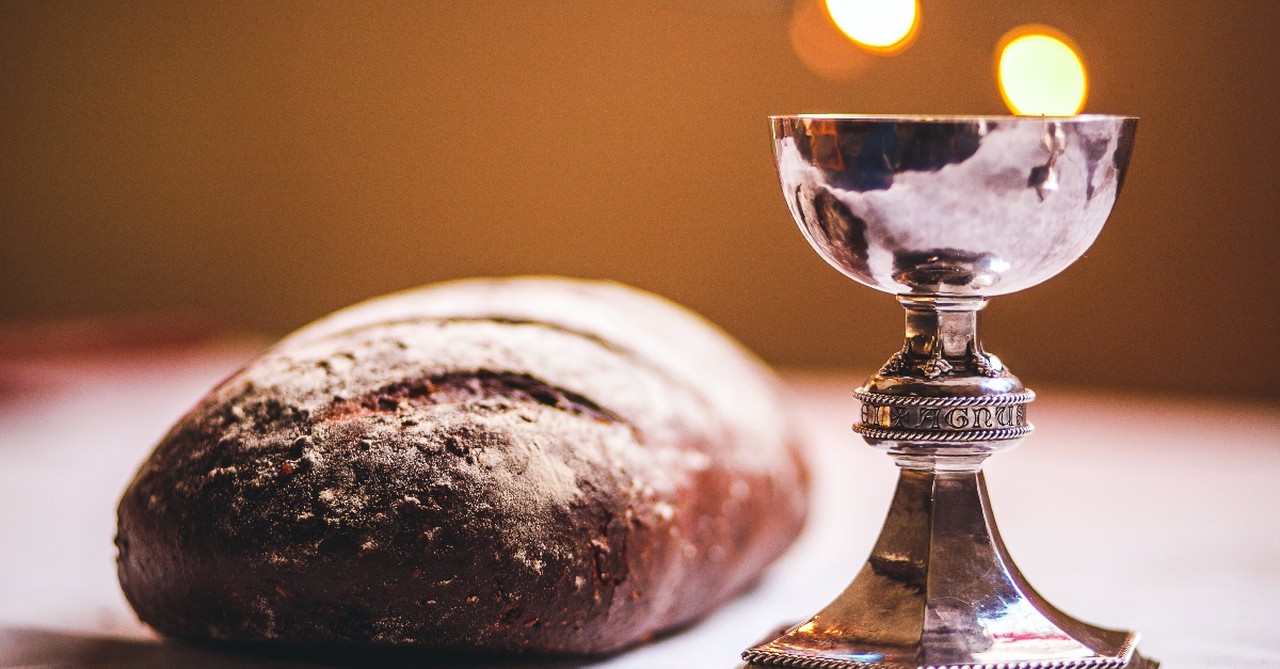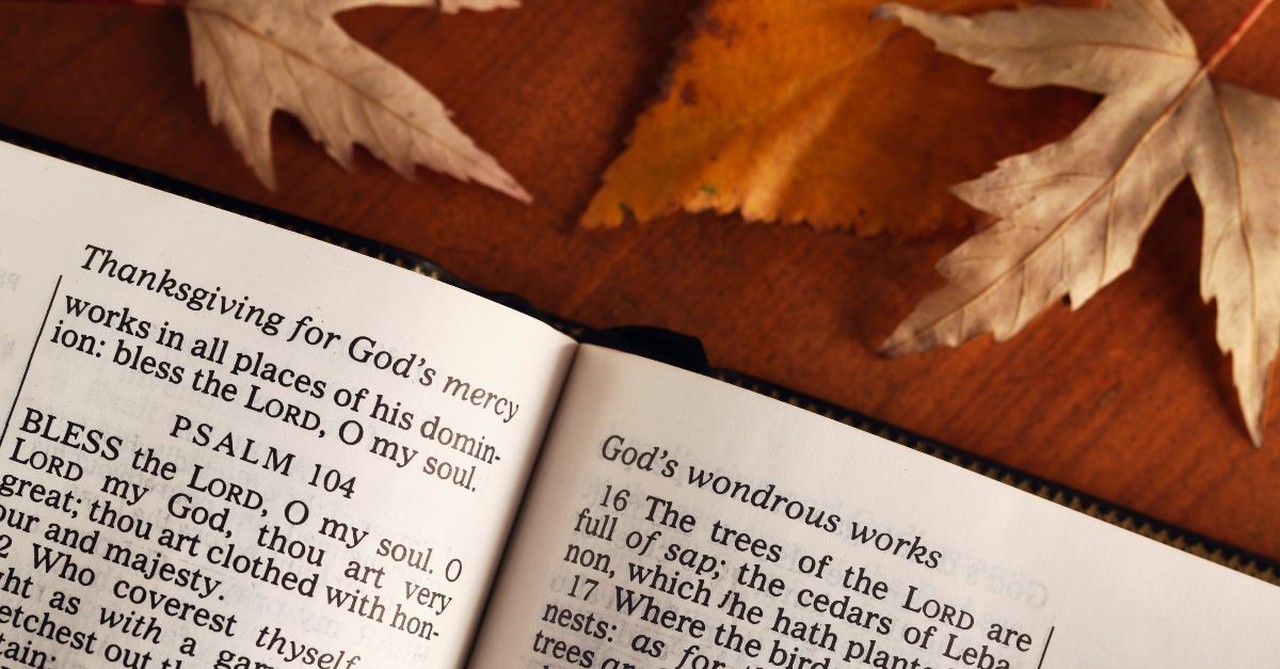10 Devotionals to Cultivate Gratitude

With the busyness of the holidays, it can be hard to remember the importance of being grateful for all the blessings in our lives. Here are 10 devotionals to cultivate gratitude no matter what is going on in our lives.
Editor's Note: If you would like a PDF version of this article, you can download that here: A 10-Day Thanksgiving Devotional to Cultivate Gratitude
Photo Credit: ©Getty/Oleksandr Yakoniuk
When It’s Difficult to Give Thanks—Psalm 73

When It’s Difficult to Give Thanks—Psalm 73
SLIDE 1 OF 10
“All in vain have I kept my heart clean and washed my hands in innocence. For all the day long I have been stricken and rebuked every morning.” - Psalm 73:13-14
Psalm 73 is one of those gritty and honest psalms. Asaph is frustrated. He is upset with God because as he looks around it seems that the righteous (Asaph) are suffering while his wicked neighbors are living large. It feels to Asaph as if the covenant blessings and curses are given backwards. Psalm 73:13-14 are the climax of Asaph’s vent.
As Asaph scans the horizon, he believes that the wicked are “always at ease.” From his perspective God doesn’t oppose the proud—he lets them have everything they want. And Asaph, and those who are trying to be faithful to the covenant are scraping by.
But look at how the Psalm ends:
“But for me it is good to be near God; I have made the Lord God my refuge, that I may tell of all your works.” - Psalm 73:28
How does Asaph end by giving thanks and taking refuge in the Lord? It is because Asaph, “went into the sanctuary of God” it was here that everything clicked (v17). He “discerned their end.” He began to realize that this life is all the wicked have. Asaph began to see things from God’s perspective and acknowledges that his ungrateful attitude was “brutish and ignorant” (v23).
We can learn from Asaph in Psalm 73 that there are three main reasons for giving thanks even when we don’t feel like it. First, we give thanks because God is good and always good. That is how Asaph started (v1) and it is ultimately where he ends. God is good even when Asaph cannot see God’s good hand.
Secondly, we can give thanks because we are upheld by God. That is how Asaph kept from stumbling. I love the “nevertheless” in verse 23. Even though he was “ignorant and brutish” God’s “nevertheless” held Asaph up. This is what kept him from buckling. God’s “nevertheless” goes deeper than any sin that we could ever commit. It’s deeper than our foolishness and all of our rebellion. We are upheld by God.
Lastly, we give thanks even when we don’t feel like it because the Lord is our portion forever. Asaph’s argument is that all of the other “stuff” of this world is the portion of the wicked. That is all they get. But not us. The Lord Himself is our portion. If this is true, then we must always be giving thanks. He is the greatest gift ever.
It is because of Jesus that the Lord will always do us good. It is because of the Lord Jesus that we are upheld by his right hand. It is because of Jesus that the Lord is our portion forever.
Photo Credit: ©GettyImages/ Blasius Erlinger
Finding Thanks in the Lord’s Supper—Luke 22:14-23

Finding Thanks in the Lord’s Supper—Luke 22:14-23
SLIDE 2 OF 10
Depending on your religious tradition the observance of the Lord’s Supper is called different things. Some traditions will call this the breaking of bread, others will call it Communion, and still others might call this the Lord’s Supper. Another name for the taking of bread and wine is observing the Eucharist.
While the word “eucharist” does not appear in most English Bibles, it actually appears numerous times. Eucharist comes from the Greek word εὐχαριστέω (eucharisteo). It means simply “to give thanks”. It is to appreciate the benefits and blessings that we have received. It is this precise word which Jesus uses in Luke 22 when he “gives thanks” over both the cup and the bread at the Last Supper.
When Jesus was thanking God for the bread and the wine, he was thanking the Father for His provision. But He was also thankful for what the provisions symbolized. The unleavened bread would symbolize the Lord being the sustenance and portion for His people. The wine would symbolize the blood shed by the Passover lamb—which would protect and cover the sinful Israelites as the death angel passed over.
But these elements pointed to something even greater. They would point to the provision of Jesus’ body and blood which would He said was given “for you”. It’s not a stretch to believe that even Jesus is giving thanks for the gospel. I say that because in the gospel of Luke he tells His disciples that He “earnestly desired” to eat this Passover meal with them. He joyously and willingly gave His life for them (and for us).
Gathering at the Lord’s table is a great way to remind ourselves of the gospel. Today, even if we are not able to physically take the elements on this day, we can be thankful for God’s provision of the body and blood on our behalf.
Photo Credit: ©Unsplash/jhc
Thanksgiving in His Presence—Psalm 100

Thanksgiving in His Presence—Psalm 100
SLIDE 3 OF 10
You’ve really blown it this time. You did that one thing that all the training material said to never do. And this isn’t the first time you’ve done it. You have a meeting with your boss scheduled for the morning. What words do you use to describe your feelings about this meeting?
Apprehension? Fear? Dread? Worry? Shame?
What about “joy” or “thanksgiving”? Would you consider those words as you approach this meeting with your boss?
This is an apt picture of our feelings as we come into the presence of the Lord. We know that we have sin. We know how God feels about sin. And yet we’re summoned to gather before Him. But somehow our experience as believers will often match that of the Psalmist in Psalm 100.
“Enter his gates with thanksgiving, and his courts with praise! Give thanks to him; bless his name!” - Psalm 100:4
How is this possible? It is possible because of what we read in Psalm 100:5: “…his steadfast love endures forever”. It is because of His love and faithfulness to us that we are able to enter into His presence with joy and thanksgiving. God’s presence, for those washed in the blood of Christ, is a joyous occasion.
To circle back to our earlier analogy, the difference is that we do not stand before our “boss” with our own record and our own merit. The person and work of Jesus Christ is like an immovable door stop into the joyous presence of God.
“Let us then approach God’s throne of grace with confidence, so that we may receive mercy and find grace to help us in our time of need.” - Hebrews 4:16
Today, be thankful that you have this access to God.
Photo Credit: ©iStock/Getty Images Plus/MKucova
Thanksgiving Through Song—Ephesians 5:18-20

Thanksgiving Through Song—Ephesians 5:18-20
SLIDE 4 OF 10
18 Do not get drunk on wine, which leads to debauchery. Instead, be filled with the Spirit, 19 speaking to one another with psalms, hymns, and songs from the Spirit. Sing and make music from your heart to the Lord, 20 always giving thanks to God the Father for everything, in the name of our Lord Jesus Christ.
This is one of those passages where we can get hung up on the details of an illustration rather than the things which Paul is illustrating. The passage above isn’t really about “don’t get drunk.” I’m not saying that Paul isn’t saying “don’t get drunk” but rather that statement is a foil for what comes next: “Instead, be filled with the Spirit…” That is his point.
Think of it this way. Can you tell when someone is drunk? Even if someone is an alcoholic you can usually tell when a person is inebriated. Paul’s point is that rather than having a worldly expression (like drunkenness), have a Spirit-filled expression. That Spirit-filled expression is shown through singing to one another and vertically.
We sing when we are happy. There are things which psalms, hymns, and songs can express that mere words cannot. There is a reason why God has given us 150 inspired songs and then in places like Ephesians he tells us to make music to encourage one another. Redeemed people should be a singing people (even if a bit off-key at times).
We also can sing when we are sad and longing and confused. The Psalms in the Scripture are not only cheery. Many of them are psalms of lament. But most of them still end in thanksgiving. It is through lament—seriously dealing with our emotions and circumstances—that we are brought into a place of thanksgiving. Authentic thanksgiving is often birthed through the kiln of suffering.
This is why we are told to “always giving thanks to God the Father for everything”. This spirit of thanksgiving resounds through all of our singing. This is only possible through Christ. This giving thanks is to God through Jesus Christ; which is another way of saying that the only way we are able to give thanks is through the gospel. Every benefit, every blessing—everything you have is there because of Jesus. Because of Jesus, we can give thanks in all circumstances—because the gospel trumps everything else.
Today, thank the Lord through song.
Photo Credit: David Beale/Unsplash
Thanksgiving Always—1 Thessalonians 5:18

Thanksgiving Always—1 Thessalonians 5:18
SLIDE 5 OF 10
16 Rejoice always, 17 pray continually, 18 give thanks in all circumstances; for this is God’s will for you in Christ Jesus. -1 Thessalonians 5:16-18
I’ll be honest. When I come upon these verses my gut reaction is to say, “yeah, right”. “Rejoice always.” Seriously!?!? Cancer. Death. Financial troubles. Emotional heartbreak. Depression. Relationship difficulties. Persecution. Losing a job. Rejoice? Are you serious, Paul?
Pray without ceasing. Really? How in the world can I possibly pray without ceasing and then do anything? How do I pray through making a bologna sandwich? What are you talking about Paul. Pray without ceasing?
“Give thanks in all circumstances”. “All?!?!” You can’t be serious, Paul. “Lord, thank you for this tragedy that has hit our family. Lord, thank you for this painful relationship. Lord thank you that this person sinned against me. What does Paul mean by these big picture things that he says essentially on all three, “Do these always”?
What Paul is saying here is that no matter what season we find ourselves in we ought to be people that are marked by joy, prayer, and a heart of thanksgiving. He’s not saying that every waking moment should be spent in prayer. What he is essentially saying is that no matter what season you find yourself in God is painting something beautiful—he is doing something wonderful, and so we can continue to rejoice, pray, and give thanks.
Do you remember Bob Ross? He’s that guy with an afro who talked softly and painted beautiful pictures. Have you ever watched a whole episode? I used to come home from school, grab a bowl of Fruit Loops, turn on PBS and escape into the soothing world of Bob Ross. But it didn’t stay serene. In almost every episode Bob would paint this beautiful picture and then out of nowhere he would plop a big giant tree. It was frustrating. The painting was already beautiful and then he’d put something in there that would unsettle me. It didn’t seem to fit.
Until it did. That was why I kept watching. Because I knew that Bob would eventually turn this big ugly tree into something beautiful. And that is what these verses in 1 Thessalonians are talking about. No matter what season the Lord has us in we are to respond to his work appropriately—we are to respond with joy, prayer, and thanksgiving. We know that God is a master painter and even if it appears ugly in one season, eventually he will make it beautiful.
Today, you can give thanks to God that He will make all things beautiful in time.
Photo Credit: ©GettyImages/monkeybusinessimages
Thankful for Where God Is Taking Us—Revelation 21

Thankful for Where God Is Taking Us—Revelation 21
SLIDE 6 OF 10
John Newton once shared this illustration about the foolishness of complaining:
Suppose a man was going to New York to take possession of a large estate, and his [carriage] should break down a mile before he got to the city, which obliged him to walk the rest of the way; what a fool we should think him, if we saw him ringing his hands, and blubbering out all the remaining mile, “My [carriage] is broken! My [carriage] is broken!”
Newton’s point is that if we know the end of the story, and the end of that story is glorious then we are foolish to bemoan the bumps in the road which get us to our ultimate destination. One of the best things we can do to increase our thanksgiving is to develop a robust understanding of where God is taking us.
This does not mean that we flit away our times on rapture charts or try to discern the details of the end times by dissecting our newspapers. Jesus warned against such things. What is healthy is meditating upon where God is taking us. Read through Revelation 21:1-8 today and meditate upon the glory of what awaits those who are trusting in Christ.
The sea passing away means that there is no more chaos. The dwelling place of God with man means that there is now unfettered access between us and God. He will wipe away every tear, there will be no more death, or mourning, or pain. Imagine that. Nothing to make you sad or sorrowful. The old order, the fallen, broken, rebellious, heart-wrenching, and soul-sucking old order, has now passed away. Death has been put to death.
He is making everything new. He will give water to the thirsty. He is fulfilling our every longing. Those deep longings which he placed within us he aims to overflow with His goodness. I remember a few years back hearing a sermon from a pastor (and I think he was quoting Jonathan Edwards) where he said he imagined heaven being like God expanding our capacity for joy every day and then filling it up and doing this every “day” for all of eternity.
If you are in union with Christ. This is what awaits you. And Jesus stakes his very self on the trustworthiness of this reality. That is why he tells John, “Write this down, for these words are trustworthy and true.” This reality is just as true as saying that the sky is blue. Jesus is accomplishing all of this on our behalf. It is ours.
Today, your carriage might be broken. But fix your eyes upon the glory which awaits you. And overflow with thanksgiving.
Photo Credit: © Pexels/Andrea Piacquadio
Thanksgiving for Others—1 Corinthians 1:4

Thanksgiving for Others—1 Corinthians 1:4
SLIDE 7 OF 10
Are there people in your life who seem so toxic and dysfunctional that you would rather shave with a cheese grater than spend time with them? Are there professing Christians that you know who seem to be botching the gospel so horribly that whenever you think of them your stomach churns? Is this the way in which Christ would have us view others?
“Whenever I think of you, I thank God for you…”
Picture in your mind the type of person of whom you would say this about? Is it someone who lives in unity with you, someone who is a good friend, a person who embodies the fruit of the Spirit and who seems to be saturated with the gospel? Or is it someone who is prideful, always fighting, not taking sin seriously, and seriously botching the gospel?
If you are anything like me, you more readily think of the first list. I thank God for people I like. I’m a bit harder pressed to be thankful for those I deem as toxic, dysfunctional, and botching the gospel. But it was precisely these of whom Paul says what he does in 1 Corinthians 1:4,
“I always thank my God for you because of his grace given you in Christ Jesus.”
Why is Paul thankful for the Corinthians? And why does he begin his letter this way? First, he is thankful because of God’s work in them. He is thankful because even though it might be only in a spark, he can see the gospel making in roads into their community. He can see the fingerprint of Jesus and because of this He gets excited, because He knows the Lord will complete His work in them.
Secondly, Paul does this because thankfulness is a great place to start when we relate to others. Whether they be the people who are easy to make a list of reasons we are thankful, or those with whom we have to stretch a little, this exercise will help us.
So, consider today spending a few moments thinking about the people with whom thankfulness easily rises to the surface. Thank God for them. But also spend some time thinking about those difficult relationships. Can you make a list of 10 things for which you are thankful for them? 50? 100? Challenge yourself. And then watch what happens to your emotions and the way you view this person. You still may have difficult things in which you must confront. Paul did in his letter to the Corinthians. But because he did it in the spirit of thanksgiving, his words to them were soaked in gospel.
Today, be thankful for others.
Photo Credit: ©iStock/Getty Images Plus/Choreograph
Pretend Thanksgiving—Jeremiah 8:11

Pretend Thanksgiving—Jeremiah 8:11
SLIDE 8 OF 10
They dress the wound of my people as though it were not serious. “Peace, peace,” they say, when there is no peace. -Jeremiah 8:11
There is a difference between hope and blind optimism. Blind optimism traffics in denial. Hope is the stuff of reality. In Jeremiah’s day, the false prophets preached a message of optimism filled with counterfeit thankfulness.
They took comfort in being in the promised land, worshipping at the temple, and being considered as God’s people. They believed that these gifts were unshakeable and unalterably theirs. Even when they went about each day denying the very God who gave them these gifts.
When Jeremiah challenged them through the word of the LORD, the prophets doubled down. They mocked Jeremiah’s message of judgment and his call to repentance. They believed that if they continued to give God lip service for all of these gifts, then He would be pleased and they could continue unabated in their rebellion.
There is a way in which we can use “thankfulness” and blind optimism as a shield for facing reality in our lives. There are times when we experience the consequence of our rebellion, but rather than calling it what it is we rename it a trial and put on the veneer of thankfulness for “God’s testing”. In reality, what is needed is repentance and not over-spiritualizing consequences.
We can fool ourselves into thinking that we are engaging in a God-honoring discipline, while at the same time we are actually circumventing the real change which God aims to bring into our lives. We should follow the path of Jeremiah and not the false prophets. When we look realistically at our life situation (whether from our own sin or even the consequence of others sins against us) we do well not to dress these wounds lightly. We do well to take all these wounds to Jesus and not try to cover them with false optimism.
Be realistic. But be a gospel-person. Don’t dress them lightly, but also don’t try to dress them yourselves. Acknowledge reality and rest in the arms of Jesus.
Photo Credit: ©iStock/Getty Images Plus/Deagreez
Prideful Thanksgiving—Luke 18:11

Prideful Thanksgiving—Luke 18:11
SLIDE 9 OF 10
The Pharisee stood by himself and prayed: ‘God, I thank you that I am not like other people—robbers, evildoers, adulterers—or even like this tax collector.
Not all thanksgiving is holy. In Luke 18 the Pharisee thanks God for all of his benefits—but also that he isn’t like the tax collector. He is engaging in prideful thanksgiving. And because of this Jesus tells us that he does not go home justified—instead that sinful tax collector who beats his chest and cries out for mercy goes home justified. But what’s so bad about his prayer?
Consider all that the Pharisee gets right. For one, he thanks God for his righteousness. He’s likely not lying about his righteous deeds. He probably doesn’t rob other people or commit adultery. He has deep morality and he is thankful for the work God has done in his life to bring that about. What is wrong with thanking God for His work in your life?
But if we inspect this further, there are at least two things that are a little “off” with the Pharisee's prayer. First, even though he is thanking God his focus is clearly horizontal. And that is what pride always does—it looks at other people and looks at self. He looks at his own life with thankfulness and at the tax collector with disdain. Pride will compare our best qualities against the worst qualities of others. It doesn’t matter how much he tries to “thank God,” at its core, his prayer is prideful because it is misfocused.
Secondly, his faith is off-centered. He clearly has a great measure of faith. And he’s not self-righteous in the way that we typically think. He’s depending upon God and upon God’s righteousness that is being created in his life. In one sense, he is trusting in God’s work for righteousness. But notice what he is trusting in for justification. He is trusting in the good that God has produces in his life as the measure of his right standing with God.
Imagine the Pharisee standing before God. God asks him, “Why should I let you into heaven?” What would the Pharisee respond? Well, God, you should let me into heaven because of the work that you have done in my life. Look at my righteousness. God, you have done such a work in me that I do not commit adultery. God, you have done such a work in me that I am not like the vile tax collectors. God, you have done such a work and here is all of the righteousness that you have created in me. Now compare that to these words from Mark Dever:
“A Christian, therefore, knows that if he were to die tonight and stand before God, and if God were to say, ‘Why should I let you into my presence?’ the Christian would say, ‘You shouldn’t let me in. I have sinned and owe you a debt that I cannot pay back.’ But he wouldn’t stop there. He would continue, ‘Yet, because of your great promises and mercy, I depend on the blood of Jesus Christ shed as a substitute for me, paying my moral debt, satisfying your holy and righteous requirements, and removing your wrath against sin”.
What is the difference? The Christian looks totally outside himself. Rather than looking at his/her life and stacking up his/her righteousness (whether believing it is God created or not) or his/her unrighteousness the believer banks totally and completely on the work of Christ. He/she looks totally outside of themselves for righteousness.
As you pursue thankfulness, be on the lookout for prideful thanksgiving.
Photo Credit: ©GettyImages/polinef
Thanks for Resurrection Victory—1 Corinthians 15:57

Thanks for Resurrection Victory—1 Corinthians 15:57
SLIDE 10 OF 10
57 But thanks be to God! He gives us the victory through our Lord Jesus Christ.
Disney recently released a new cartoon connected with the Marvel Universe. It’s called, “What If…?” In each episode, they explore what would have happened if an alternate reality had taken place. Like, What If Spiderman Had Never Been Bitten? In 1 Corinthians 15, Paul engages in his own “what if?” What if there had been no resurrection?
Paul then lists six things that would be true if the resurrection was not a reality:
- Our preaching is in vain
- Your faith is in vain
- We are misrepresenting God, false witnesses.
- We are still in our sin.
- We are all people to be most pitied.
- Those that have died have no hope
In other words, every aspect of the Christian faith is a farce. And if Christianity is still a farce, then we have no Savior and we are still in our sins. But then Paul flips the script. Jesus Christ has been resurrected. Which means, then, that all of those things which wouldn’t be true without the resurrection are now true because of the resurrection.
It is through Christ that we have this victory. This is precisely what Paul means at the end of the chapter when he says “O death, where is your sting?” He notes that “The sting of death is sin, and the power of sin is the law.” But through the resurrection, Christ has overturned the curse. Though we may still physically die it is true that “death is swallowed up in victory”.
Death doesn’t have the last word over your life. Jesus does. And thanks be to God, he has given us the victory.
Today, be grateful for all of that which the resurrection of Christ has made true in your life.
Photo Credit: ©Unsplash/Iyan Kurnia
Originally published October 31, 2023.









